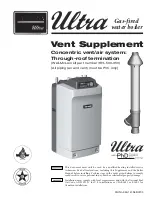
- 6 -
Service Call 0844 736 9138, Technical Help (Chargeable) Call 0906 802 0253
In IE, the installation must be carried out by a competent person
approved at the time by the Health and Safety Executive and
installed in accordance with the current edition of I.S.813
“Domestic Gas Installations”, the current Building Regulations
and reference should be made to the current ETCI rules for
Electrical Installation.
GB: the following Codes of Practice apply: BS4814, BS6798,
BS5440 Part 1 and 2, BS5546 Part 1, BS5449, BS6891,
BS6700, BS7074 Part 1 and 2, BS7593, BS7671.
IE: I.S.813, BS5546, BS 5449, BS 7074, BS 7593.
NOTE: For further information, see the current issue of the
Building Regulations, approved document L1 ( in the UK) and
the following current issues of:
1) Central heating system specifi cation (CheSS) and
2) Controls for domestic central heating system and hot water.
BRECSU.
Gas Supply
The gas installation must be in accordance with the relevant
standards.
In GB, this is BS6891.
In IE, this is the current edition of I.S.813 “Domestic Gas
Installations”.
The supply from the governed meter to the boiler must be a
minimum of 22mm diameter and provide a steady inlet working
pressure of 20mbar (8in wg) at the boiler. On completion, test
the gas installation for tightness using the pressure drop method
and suitable leak detection fl uid, purge in accordance with the
above standard.
Domestic Hot Water
All domestic hot water circuits, connections, fi ttings must be
in accordance with the relevant standards and water supply
regulations.
GB: Guidance G17 to G24 and recommendation R17 to R24 of
the Water Regulations Guide.
IE: The current edition of I.S.813 “Domestic Gas Installations”.
Heating System
In GB, it is necessary to comply with the Water Supply (Water
Fittings) Regulations 1999 (for Scotland, the Water Byelaws
2000, Scotland). To comply with the Water regulations your
attention is drawn to: The Water Regulations guide published
by the Water Regulations Advisory Service (WRAS) gives full
details of the requirements.
In IE, the requirements given in the current edition of I.S.813
“Domestic Gas Installations” and the current Building
Regulations must be followed.
Electrical Supply
The boiler MUST be earthed. All system components shall
be of an approved type and all wiring to current I.E.E. wiring
regulations. External wiring must be correctly earthed, polarised
and in accordance with the relevant standards.
In GB, this is BS 7671.
In IE, this is the current edition of ETCI rules.
The boiler MUST be connected to a permanent 230V ac, 50Hz
supply.
Connection of the whole electrical system of the boiler, including
any heating controls, to the electrical supply MUST be through
one common isolator and must be fused 3 Amp maximum.
Isolation should be by a double pole switched fused spur box,
with a minimum gap of 3mm for both poles. The fused spur
box should be readily accessible and preferably adjacent to the
appliance. It should be identifi ed as to its use.
Alternatively connection can be made through an unswitched
shuttered socket and 3A fused 3-pin plug both to the current
issue of BS 1363, provided they are not used in a room
containing a bath or shower.
Wiring to the boiler must be PVC 85
O
C insulated cable, not less
than 0.75mm
2
(24/0.20mm).
3.3
Other regulations
Gas Safety (Installation and Use) Regulations
In your own interests and that of safety, it is the Law that ALL
gas appliances are installed by a competent person approved at
the time by the Health and Safety Executive in accordance with
the current issue of these regulations.
Control of Substances Hazardous to Health
Under Section 6 of The Health and Safety at Work Act 1974, we
are required to provide information on substances hazardous to
health. The adhesives and sealants used in this appliance are
cured and give no known hazard in this state.
Insulation Pads:
These can cause irritation to skin, eyes and the respiratory tract.
If you have a history of skin complaint you may be susceptible to
irritation. High dust levels are usual only if the material is broken.
Normal handling should not cause discomfort, but follow normal
good hygiene and wash your hands before eating, drinking or
going to the lavatory.
• If you do suffer irritation to the eyes or severe irritation to the
skin seek medical attention.
4 Recycling
The recycling of the packaging must be carried
out by the qualifi ed professional who installed the
appliance.
4.1
Packaging
We recommend that you recycle the packaging of the appliance
in a responsible fashion.
• Sort the waste in order to separate those elements which can
be recycled (cardboard, plastics ...) and those which cannot
be recycled.
• Dispose of waste in accordance with existing regulations.







































